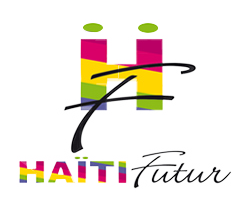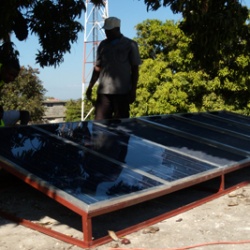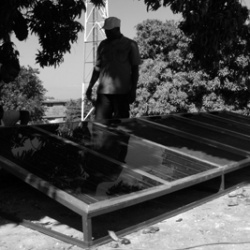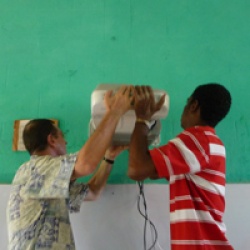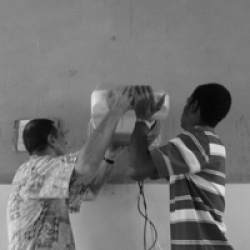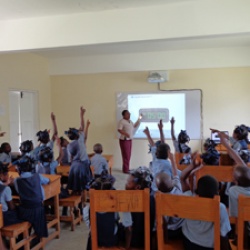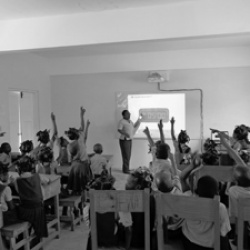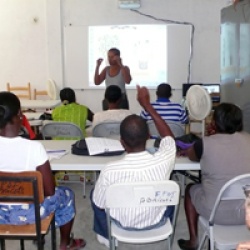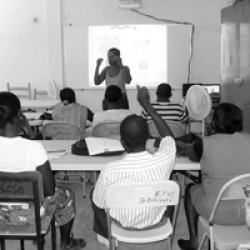THE DIGITAL EDUCATION PROGRAM
Digital education can be an important tool in responding to the obstacles of large-scale and quality education in Haiti.
Digital education relies on basic equipment made up of a laptop, a video projector, and a digital whiteboard (TNI) that allows teachers to teach their courses with support from digital exercises.
Digital lessons are fun and allow children to learn with pleasure. Teachers are guided by the lessons projected on the board, allowing them to break out of rehearsal-based teaching and interact with their class by having them reflect, observe and participate.
Begun in 2010, the digital education program aims to modernize and improve education through the effective use of new technologies.
To ensure the quality of training and educational content produced, Haiti Futur integrates official recommendations on education and ensures that all courses follow the curriculum of the National Ministry of Education in Haiti.
The process consists of the installation of digital whiteboards, the production of adapted digital content and adoption ministry standards. Teachers receive instructive and technical training in the use of these tools.
Currently, 200 schools have already benefited from the program.
The success of such a program depends on 3 elements:
- Quality and reduced cost of equipment,
- The creation and / or adaptation of content based on the official programs of the Ministry,
- Teacher training, taking into account the current level of teaching staff.
These issues require partnerships to coordinate the efforts and energies of each of these elements.
THE SELECTED SCHOOLS
Haiti Futur supports schools and institutions which it has validated on the grounds of the durability and quality of the teaching staff and educational projects.
Our action is generally focused on isolated schools in rural areas that are most affected by a lack of educational quality and basic facilities, such as electricity.
EVOLUTION OF THE PROGRAM
2010-2012
Haiti Futur installs 10 digital whiteboards in Haiti. The Foundation of France brings 30 more; then a partnership is created with the MENFP, Haiti Futur and other private associations (Rotary Club, Planète Urgence, etc.) for the equipment of 180 other schools, in the basic schools (⅔ of private schools and ⅓ of public schools), as well as in other institutions: installation of digital whiteboards, training of teachers, and provision of educational content.
2015-2016
– Support for the self-financing of schools and institutions to equip themselves with digital whiteboard and train their teaching staff; access to educational content created by HF and its partners, which are free of rights.
– Launch of the “Adopt a School” program, which includes electrification, digital whiteboards equipment, teacher training and access to educational content.
Haiti Futur will continue to support individuals and institutions wishing to invest in these two programs in the future.
2017-2018
The PRIMTICE program works, in partnership with the MENFP, the MTPTC and Electriciens sans Frontières (Electricians without Borders) and financed by the World Bank, to equip 500 public basic schools with electricity, digital whiteboards, training and educational materials.
2018-2020
The program COMOSEH, in partnership with the Haiti Collective of France, the Group of Educators Without Borders, Haiti Futur (associated with GRAHN and REFERANS), financed by the AFD, will equip 30 schools in digital and adapted infrastructure: electricity , digital whiteboards, training, educational content, gardens, running water, toilets and canteen.
OUR SPONSORS AND PARTNERS
Since our work has only been possible and will continue to be realized only thanks to our partners, it is important to mention them:
- MENFP
- MTPTC
- Fondation de France
- AFD
- Banque Mondiale
- USAID
- Associations privées
- Rotary Club
- Planète Urgence
- ESF
- GREF
- CHF
- GRAHN
- REFERANS
- ESIH
- KOPIVIT
- PRODEV
- Jean Baptiste Pointe du Sable
- Montessori
- Vision Nouvelle Limbe
- Université d’Ottawa
- Mc Gill
- Zanni Lasante
- etc.
COST OF THE PROGRAM
The total cost to equip a school is $15,000
Solar installation
- The installation of solar panels with a maximum of 600W
- The installation of a 1500 W inverter
- The installation of 4 lithium batteries of 75Ah
Installation of the Digital Whiteboard
- The installation of an interactive video projector EPSON
- The installation of a board and eventually a stage (if necessary)
- The installation of a laptop
Teachers Training and Follow-up
- The training of teachers to provide them with the autonomy necessary to use interactive digital white boards
- Follow-up of professors during the two years after installation
- The supply of necessary manuals to ensure the smooth running of the program (master’s guide, etc.)
